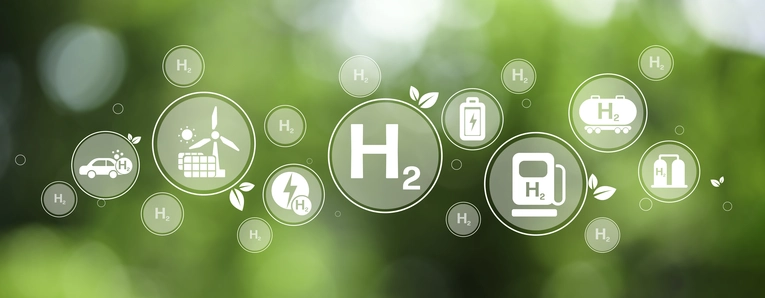Renewable energies will replace fossil fuels in the long term and are an integral part of the future energy supply system. Green hydrogen in particular is seen as one of the key elements of the energy transition. Hydrogen is versatile - it can serve as the basis for clean mobility, for alternative fuels, as energy storage or as a process gas in industry. In addition, hydrogen technologies offer new potential for value creation and many sustainable jobs.
This is where the Renewable Energies and Hydrogen Technology program comes in. The program focuses on how the future supply of renewable energy can be safely organized. The combination of engineering expertise and interdisciplinary knowledge results in a particularly practical and future-oriented study concept. A unique focus is on technologies for the use of hydrogen as an energy source and its derivatives. The development of systems for energy generation, storage and transport are also central to the program.
Graduates of the Renewable Energies and Hydrogen Technologies program are able to develop complex solutions in terms of economic efficiency and sustainability and to actively shape the energy and mobility transition.
Renewable Energies & Hydrogen Technology (M. Eng.)

Master of Engineering (M. Eng.)
4 semesters (90 ECTS-CP)
Winter
in progress
English
19.370 EUR + administration fee/semester: € 72
Online and Ingolstadt
1. Semester
Solar Energy Systems
Electronics and Control Engineering for Energy Systems
Energy Economics, Markets and Regulations
Renewable Energies and Storage
2. Semester
Hydrogen Production
Hydrogen Storage and Transportation
System Design and Optimization
Wind Energy Systems
3. Semester
Project Work
Plant and Equipment Design in Hydrogen Technology
Hydrogen Utilization and Sector Coupling
Hydrogen Safety, Standardization and Legal Aspects
4. Semester
Master Thesis
Quick Info
1 Qualification requirements for admission to the continuing education Master's degree programme are
a. Proof of successful completion of an engineering, natural science or technical degree programme at a German higher education institution
or a comparable degree with at least 210 ECTS credit points or equivalent scope of study or an equivalent successful domestic or foreign degree.
b. proof of at least one year of relevant, qualified practical professional experience following completion of the university degree programme referred to in a).
c. proof of sufficient knowledge of English (language level B2 of the Common European Framework of Reference for Languages).
- Generation of renewable energies as well as production, transport and storage of hydrogen
- Development of corresponding electrical and process engineering systems
- Conversion from fossil energy sources to hydrogen (e.g. steel and cement production)
- Research and development
- Technical and economic planning and project management in the fields of renewable energies and hydrogen technology.
Consultancy and further training
The future graduates will mainly work in the following industries
- Energy producers and suppliers, municipal utilities, municipal transport companies
- Mineral oil industry
- Chemical industry
- Plant planning and construction (e.g. fuel cells, electrolysers)
- Energy-intensive industries (e.g. manufacturers of steel, aluminium and cement)
- Property industry (e.g. energy-efficient renovations)
- Consulting, further education
- Aviation industry
- German and international students.
- People who want to contribute to limiting climate change.
- People who are interested in sustainable energy production and energy supply, with a focus on hydrogen applications, and who want to work in these areas.
- People with technical and scientific interests.
- Students who envisage a future career in the international field of hydrogen technology.
Programme Director

Programme Manager


![[Translate to English:] Logo Akkreditierungsrat: Systemakkreditiert](/fileadmin/_processed_/2/8/csm_AR-Siegel_Systemakkreditierung_bc4ea3377d.webp)








![[Translate to English:] Logo IHK Ausbildungsbetrieb 2023](/fileadmin/_processed_/6/0/csm_IHK_Ausbildungsbetrieb_digital_2023_6850f47537.webp)


